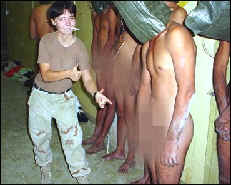|
The
feminist cultural assumption justifying women in combat
is that violence against women in war and violence done
by women during warfare are costs society must accept in
order for "equality" to advance. Conservatives
were shouted down when they warned that placing women in
combat would not only expose them to abuse but could
turn them into abusers.
The same champions of feminism who dismissed these
arguments out of hand now profess great shock at the
images of women roughing up male prisoners at Abu Ghraib.
"The behavior depicted in the photos -- which,
among other things, show naked prisoners being subjected
to sexual humiliation by American women -- defies basic
standards of human decency and the accepted conventions
of war," editorialized a stunned New York Times.
The image of that female guard, smoking away as she
joins gleefully in the disgraceful melee like one of the
guys, is a cultural outgrowth of a feminist culture
which encourages female barbarians. GI Janes are kicking
around patriarchal Muslims in Iraq? This is Eleanor
Smeal's vision come to life. Had Thelma and Louise gone
off to Iraq -- and sexually humiliated some of Saddam
Hussein's soldiers as payback for abuse to Jessica Lynch
a few cities back -- the radical feminists could make a
sequel.
Elaine Donnelly of the Center for Military Readiness
predicted that women in combat would lead to their
"coarsening." Speaking to TAS, she
asked a question no mainstream newspaper will bother to
ask: "Why were women assigned to watch the male
prisoners?" The answer lies in the
"interchangeability idea" the Clinton military
hammered home, she says. The idea was "sexuality
doesn't matter," she says. "Men and women are
interchangeable."
Whatever male warriors do, so should women. If they
rough up captives, why shouldn't women too?
Feminists are good at creating a culture that produces
"equal-opportunity abusers," Donnelly says.
What happened at Abu Ghraib is also happening in
feminist America, she adds, pointing to an Associated
Press article from last month on a "disturbing
trend around the country. Girls are turning to violence
more often and with terrifying intensity."
AP reported that girls, bereft of maternal role models
and soaking up pop culture images that lionize female
warriors, are catching up to teenage boys in arrests for
violence (the boy-girl ratio of arrests for violence was
10-1 a generation ago, now it is down to 4-1. School
expulsions bear this out as well.) AP gives such
examples as girls pummeling each other at a birthday
party, sending twelve-year-old Nicole Towes into a coma,
and last May's videotaped hazing session among girls at
Glenbrook High School in suburban Chicago.
Perhaps in the eyes of feminists this isn't a crisis but
a potential social program and these girls deserve ROTC
credits. Perhaps we're not sufficiently conditioned to
see that girls will be girls, and that for the sake of a
GI-Jane military in years to come we must tolerate a few
birthday-party pummelings. Just a few broken test tubes
in the glorious experiment feminism has planned for us.
But what about that Clinton-era talking point that women
in combat would make the military more
"sensitive"? Apart from its ludicrous
suggestion that sensitivity was an overarching military
objective, the claim was absurd on its own terms, since
the whole premise of women in combat is that men
shouldn't be sensitive about the exposure of women to
the violence of war, either as its victims or its
perpetrators.
When Elaine Donnelly explained to the feminists that
women in combat would mean the exposure of women to rape
and torture in captivity, their response was to say that
America could get used to violence against women, and
that men could be conditioned out of their chauvinism.
And that's what the feminized military endeavored to do,
setting up programs to teach male soldiers how to handle
being in captivity with brutalized women.
Trainers at the Survival, Evasion, Resistance and Escape
training center at Fairchild Air Force Base in Spokane,
Washington, acknowledged to Donnelly and others that
women in combat would require a conditioning program for
average Americans: "If a policy change is made and
women are allowed into combat positions, there must be a
concerted effort to educate the American public on the
increased likelihood that women will be raped, will come
home in bodybags, and will be exploited. The
consequences of not undertaking such a program would be
a large scale disillusionment with the military should
the United States get in a protracted military
engagement."
Now America needs a conditioning course not on the abuse
of American women taken in defeat, but abuse by American
female soldiers in victory. The feminists call this
progress.
George Neumayr is managing editor of The
American Spectator.
|
